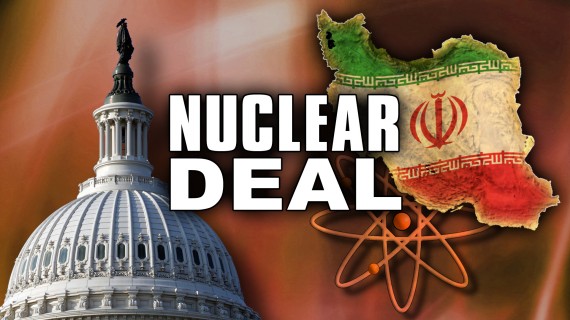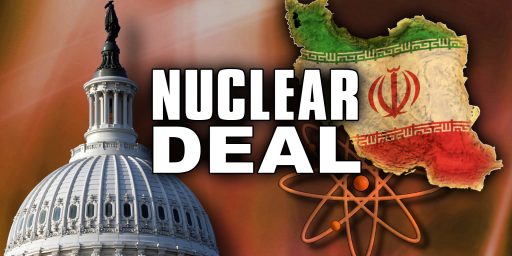Democrats Now Have Enough Support To Block A Final Vote On The Iran Nuclear Deal
At least on paper, Senate Democrats now have enough votes to block the Senate from voting on a resolution disapproving of the Iran Nuclear Deal.
Senate Democrats now have, at least on paper, enough votes to block a motion disapproving of the Iran nuclear deal from even going to a vote:
Democrats clinched the crucial Senate votes Tuesday to block passage of a disapproval resolution against the Iran nuclear accord, an outcome that would be a major victory for President Barack Obama against united Republican opposition.
But amid fast-paced developments as lawmakers returned to Washington from their five-week summer recess, supporters of the deal stopped short of declaring victory. That was because it remained uncertain whether all 41 Democratic and independent senators now on record in favor of the deal would also support a filibuster to block a final vote on the disapproval resolution.
Still, the complicated machinery of Congress was turning in favor of the president on his top foreign policy priority, despite GOP control of both the House and the Senate. Already supporters of the deal have the votes in hand to uphold Obama’s veto of a disapproval resolution, should that become necessary. Blocking the disapproval resolution with a filibuster, while ideal from the White House view because it would spare Obama from having to use a veto, would not change the ultimate outcome.
“This agreement will stand,” Senate Minority Leader Harry Reid, D-Nev., said in a speech Tuesday morning at the Carnegie Endowment for International Peace. “America will uphold its commitment and we will seize this opportunity to stop Iran from getting a nuclear weapon.”
As the day began Tuesday Sen. Joe Manchin of West Virginia announced his opposition to the deal, a surprise “no” vote from a moderate Democrat who had sounded like he favored the pact aimed at curbing Iran’s nuclear ambitions.
But that setback for supporters was erased within the hour as three Democrats seen as potential “no” votes on the deal all announced they would support it. Those senators were Richard Blumenthal of Connecticut, Ron Wyden of Oregon and Gary Peters of Michigan.
“The fundamental question for me is what this agreement means for the prospects of Iran getting a nuclear bomb,” Wyden said. “This agreement with the duplicitous and untrustworthy Iranian regime falls short of what I had envisioned, however, I have decided the alternatives are even more dangerous.”
The agreement struck by Iran, the U.S. and five world powers in July will provide Iran hundreds of billions of dollars in relief from international sanctions in exchange for a decade of constraints on the country’s nuclear program.
Republicans who control the House and Senate strongly oppose the pact, saying it makes dangerous concessions to Iran, and hope to push through a resolution of disapproval this week.
Last week of course, it became obvious that the President had sufficient support in the Senate to block any effort to override his veto of a disapproval resolution after Maryland Senator Barbara Mikulski announced her support. If these numbers hold, then the President would avoid having to veto the bill at all since the legislation that established the process under which the vote is happening provides that the deal with be presumed approved if Congress fails to vote on it within 60 days after receiving the agreement. With that date fast approaching, a solid Democratic bloc in favor of blocking a cloture motion would mean that the opposition to the nuclear deal would end with a wimper, rather than the bang of what would be only the 5th veto of Barack Obama’s Presidency. On some level at least, this seems to be inappropriate. It is already clear that the effort to block the deal will fail since Congress will be able to override the President’s veto. Given that, and given the importance of the issues involved, it strikes me that the proper thing to do would be to allow the vote to go forward.
Delaware Senator Chris Coons, who supports the deal, seems to agree:
One day after announcing his support for the Iran nuclear deal, Democratic Sen. Chris Coons of Delaware said he wants the Senate to get an opportunity to vote on the proposal.
“I think it would be really regrettable if we didn’t ultimately go to the floor and cast our votes for or against this deal,” Coons said Wednesday on CNN’s “New Day.”
Coons’ support put the Obama administration just one vote away from the number needed to keep the Republican majority, which is opposed to the deal, from snagging enough Democratic support to override President Barack Obama’s veto on a motion disapproving of the proposal.
(…)
But while Coons said “there should be” a vote on the deal, he rested the fate of that vote squarely on the shoulders of Senate Majority Leader Mitch McConnell and the top Republican’s ability to reach an agreement with Senate Minority Leader Harry Reid to cut down debate time.
The statement is sufficiently ambiguous that it’s not clear if Coons would be willing to vote in favor of a Cloture Motion to allow a final vote to take place. As it stands, his support alone would not be necessary for Democrats to get the 41 votes they need to block the final vote. Washington Senator Maria Cantwell has still not announced her intentions regarding the deal, and if she ends up coming out in support of it she could be the 41st vote the Democrats need even if they lost Coons. Given the way the math is working, though, Democrats could not afford to lose any more that Coons on a Cloture Motion. So if there are any other Democrats who feel the same way that he does, it may be the case that we get the final vote after all and President Obama is forced to vote the resolution.







We should see a vote so those who want war are on record as choosing war.
Is there a single Congressional Republican – in the House or the Senate – who will vote to support this deal?
We’re going on 7 years of this type of ‘governance.’
@al-Ameda: War good, President Obama bad. They seem to forget that politics and diplomacy are not black and white, it’s the art of the possible, not the perfect.
We don’t need a vote to know where everyone stands on this. All you have to do is look where they sit. (with the exception of the 4 Mouseketeers)
We shouldn’t forget: this is mostly Netanyahu’s fault. If he and Dermer hadn’t concocted the horrible idea of giving an anti-Iran speech in front of Congress as an electoral ploy for Netanyahu to look important in front of Israeli voters by working directly against his greatest ally on the world stage, he might not have pissed off Democrats enough to vote for this deal.
No matter how sensible the deal, the politics of it wouldn’t have worked out without that crazy Bibi.
Why? The end result is the same, the deal goes forward. Why does it matter if that happens via failure of a cloture vote or failure to override a veto?
@Tillman:
The speech worked out great for Netanyahu. He got reelected, didn’t he?
Even if the vote loses, those who oppose this misbegotten, woeful agreement will have achieved a moral victory.
@Tyrell:
You keep typing that kind of crap, but never back it up with facts.
Just emotional garbage based on some fantasy that has ever existed.
Go back to watching Nickelodeon.
@Grewgills: Why? The end result is the same, the deal goes forward. Why does it matter if that happens via failure of a cloture vote or failure to override a veto?
Because it’s a corruption of the process. It add another layer of obfuscation and denial of responsibility that makes it harder for the public to follow the debate.
And Republicans were far more guilty of this under George W. Bush, stopping the Democrats from passing bills that he was sure to veto.
Mike
@David in KC:
Oh, I don’t know about that. I think black & white plays a pretty significant part in the GOPs complete rejection of Obama.
The White House crosses one more item of its bucket list — a takedown of Dick Cheney which might even cause someone with as little shame as he has to leave the political scene for a while:
“It then segues into the abundant news clips from the run-up to Iraq War in which Cheney offers scores of claims first urging then defending military action — from touting the presence of weapons of mass destruction to predicting that Iraqis would great American troops “as liberators.””
Google “plutonium Iran” and you’ll find that too much emphasis is being placed on the number of centrifuges allowed by the treaty. Centrifuges are used for separating the uranium isotope that can be used in an atomic bomb from the far more common isotope that can’t be used as bomb material. Separating these isotopes is hard, and for that reason and others plutonium is used in 95% of atomic bombs. One of the major achievements of the treaty is that it places severe restrictions on Iran’s ability to produce plutonium. It goes without saying that this aspect of the treaty seems to be virtually unknown to the public, almost certainly because of really crummy reporting. I’m not sure whether this is due to dishonesty or ignorance.
@Tyrell:
And a moral victory, and four dollars, will get you a latte.
@anjin-san: Nice to see someone hit my nice and easy pitch out of the ballpark.